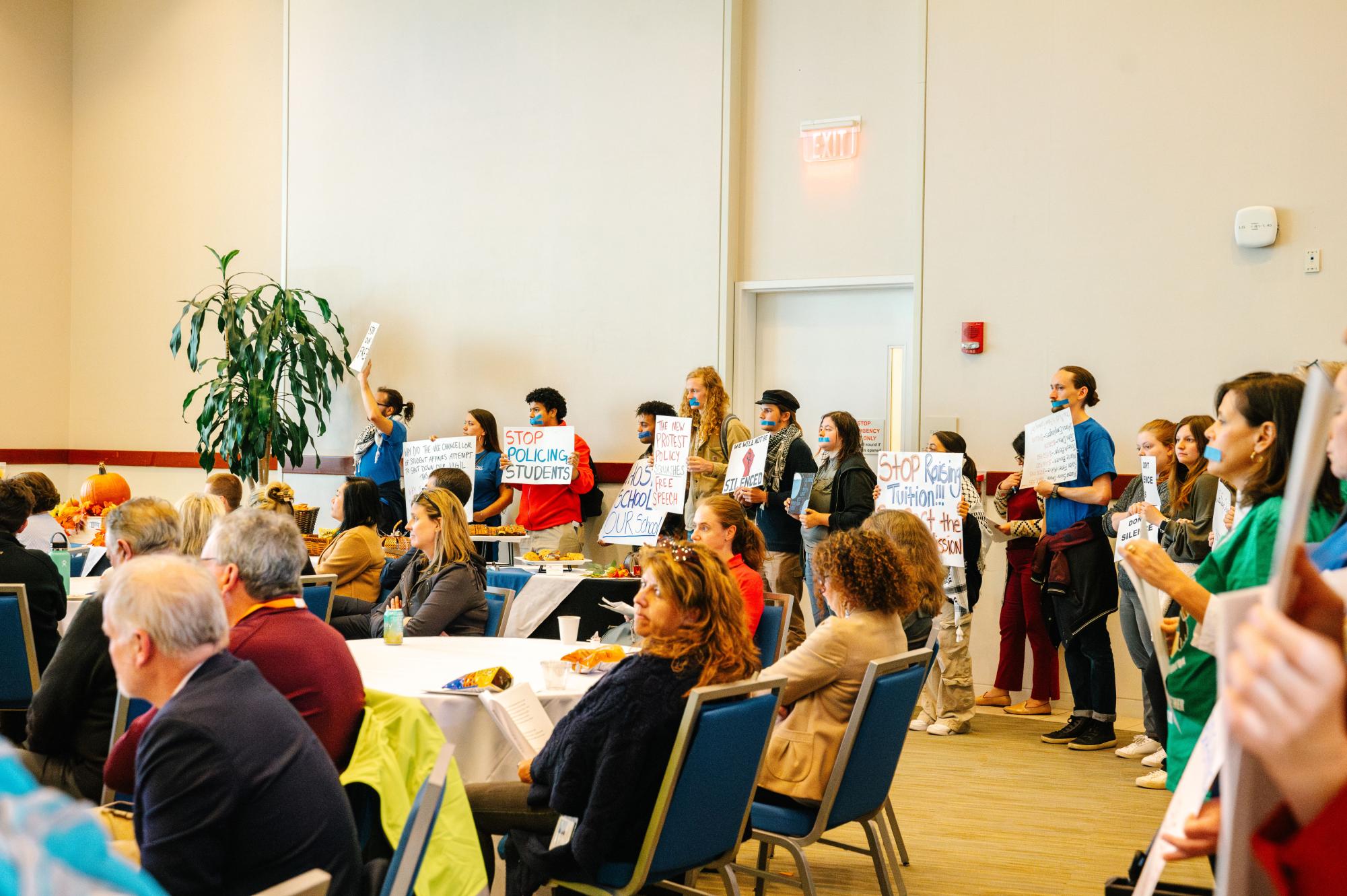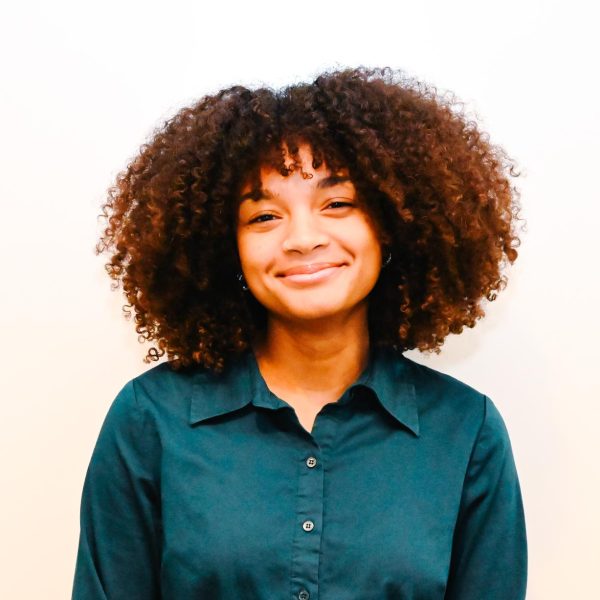Leading up to the Oct. 10 campus update, spearheaded by Chancellor Marcelo Suárez-Orozco and the UMass Boston administration, the environment in the Campus Center Ballroom was thick with tension. It was almost as if everyone knew that something was about to happen. I was acutely aware of the substantial UMass Boston Police presence, noting how the officers were consolidated around the entrance, constantly peeking out into the hallway.
Just outside the doors, members of the Beacon Coalition for Action and campus unions were gathering. They held signs that said, “DON’T SILENCE US,” “STOP CRUSHING OUR RIGHTS TO FREE SPEECH” and “STOP POLICING STUDENTS.” Some ripped off pieces of blue tape and pasted them on their mouths; many wore their union shirts and others donned kufiyahs. As the group marched quietly toward the Ballroom’s doors, the police officers tried to stop the group from entering, apparently concerned that they were there to cause a disturbance. After a moment of tense conversation with the officers, the police finally allowed them to enter.
As the coalition came into the Ballroom, I was overwhelmed by how impactful their presence was — those attending the campus update turned their attention away from Chancellor Suarez-Orozco and gazed at the sight. Dozens of protesters lined up quietly along the back of the room, staring intently at the podium where the Chancellor was speaking. Not a single word was uttered from the lips of a single protester, but the look in their eyes told a story of frustration, disappointment and the fiery courage needed to channel those emotions into action.
I felt on edge as I filmed the protesters standing tall and proud, refusing to break their gaze away from the speakers. I worried about all the ways things could possibly go awry — and these scenarios were not a result of my imagination alone.
Tuesday, Oct. 8, university administration responded in a discouraging and unjustly repressive manner to the Beacon Coalition’s vigil. It honored the lives taken by genocide in Gaza and other current global conflicts, along with the killing of Marcellus Williams, an innocent man executed by the state of Missouri. The vigil was a peaceful display of mourning from a diverse collective of our school’s students and faculty, yet was met with hostility and shocking unprofessionalism.
Later that week, I was privileged to have a conversation with Gibby, a junior who has been incredibly active in the movement for justice in Palestine and vocal advocate against racial oppression in America and abroad. Growing up in a world that Gibby said “was not designed for me,” has empowered him to understand the pain of marginalized groups and campaign for change, including giving a moving speech at the vigil.
Reflecting on that moment, he expressed frustration with the university’s attempt to dismantle the gathering. “Why would you ever feel the need to shut down a vigil? Because the space wasn’t reserved, because a certain paper wasn’t turned in five days in advance?” As I listened, I could feel the incredible weight and power behind his words. He continued, “You feel like you have the authority to tell people you can’t grieve, you can’t be sad, you can’t feel pain, you can’t mourn, you can’t be angry? That’s insane.”
Like many students, Gibby was drawn to the way that UMass Boston promoted itself as an inclusive, diverse and safe institution for all. This safety is meant to be facilitated and maintained by the UMass Boston Police, but instead of protecting the rights of the community to protest, their actions have been deemed a threat.
“Every time I say this isn’t right, someone is there with a gun,” he said. “So what are you telling me? That if I say no, that I might get shot, I might get wounded, I might die? It makes no sense why, if there is opposition, I should be under the threat of death.” Gibby’s feelings are not foreign: student protesters have been forced to grapple with their morality and the despicable risk of being assaulted at the hands of the police — architects of state-sanctioned violence — even at one’s own school.
This was a reality that I was terribly attuned to while I watched the protestors stand firm at the campus update protest. They made the massive ballroom feel crushingly small. In doing so, the attendees and the administration were forced to come into close contact with an uncomfortable actuality that many were ignorant of, avoided recognizing, or dismissed outright.
When Chancellor Suárez-Orozco reached the end of discussing some recent university highlights, he launched into an angry, intentional oration, proclaiming that “At UMass Boston, our efforts will remain focused on encouraging dialog, understanding of different viewpoints in the classroom, at special lectures, and at campus activities, rather than issuing statements on political, social, economic or global matters.”
In saying this, Chancellor Suárez-Orozco acknowledged — perhaps unwittingly — a fact that the protesters knew very well: over the past year, there has been little to no public recognition of events like the genocide in Gaza or the war in Lebanon from the administration. Additionally, the multiple cease-and-desist letters filed by faculty and student organizations, alongside additional statements pertaining to the updated Space Use Policy and Protest and Demonstrations Advance Notice Form, have been ignored. By refusing to engage in dialogue with members of the UMass Boston community and consider the impact of these unjust provisions, the administration has turned its back on what it means to provide a liberal education.
Each word Chancellor Suárez-Orozco spoke from then on was like an arrow shot straight at the group of protestors. “Let me be clear. Let me be clear. We will always defend the right of free expression and promote academic freedom. We will remain a community where issues can be debated in a CIVIL, INFORMED, and RESPECTFUL manner.”
In my eyes, there was nothing more civil, nothing more informed, and nothing more respectful than the way in which the protestors chose to show their discontent. By doing so in silence, with thoughtful intent, and with the power of community, the protest rattled the very forces perpetrating the struggles that forced the action to occur.
Over the past year, I’ve been faced with obstacles as a writer, and now editor, of The Mass Media’s opinions section. I’ve checked my email to find angry messages critiquing my writing or asking me to reevaluate my political positions. I’ve walked to class and seen flyers posted in hallways that “satirically” attempt to corrode the content of my articles — pieces that I have crafted with pride and factual evidence. I’ve had my identity called into question as a Black Jew and been faced with intimidation and hostility. These obstacles have done nothing but fuel my motivation and bolster my confidence in my work.
In that, I relate to groups like the Beacon Coalition, because I know that when resistance is met with resistance, it means you are doing the right thing. The monumental power found in taking action is only further sustained by repressive responses, and I deeply admire how UMass Boston’s activists have harnessed it into continuing their beautiful, radical fight for our community’s welfare.
This article appeared in print on Page 13 of Vol. LVIII Issue V, published Oct. 21, 2024.



